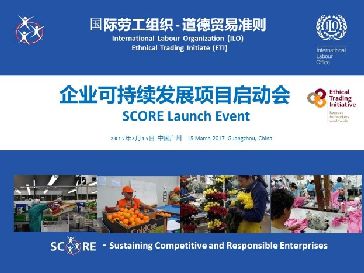SCORE Launch Event under the ILO & ETI PPP Collaboration Framework
ILO and ETI to aid SMEs in Guangdong that supply international brands
On 15 March 2017, the ILO Office for China and Mongolia and Ethical Trading Initiative (ETI) launched a project to improve the productivity, competiveness and sustainability of Small and Medium Enterprises (SMEs) in Guangzhou City, Guangdong Province, under the ILO’s Sustaining Competitive and Responsible Enterprises or SCORE program.

So far, 16 factories have registered for the program in Guangzhou. They will receive training, coaching and consultation services specifically tailored to help SMEs improve their social performance while maintaining business competitiveness.
“The SCORE Program suits the needs of SMEs in improving their productivity, quality and management systems. It is first and foremost about capacity-building,” said Gao Yun, Representative of the ETI Office for South East Asia and East Asia.
It provides constructive expertise to factories and addresses those issues that cannot be resolved through an auditing-only approach. It helps establish bipartite cooperation, which includes worker participation, when seeking improvement solutions. And it places emphasis on establishing sustainable management systems which will continue even after SCORE ends."
Gao Yun, Representative of the ETI Office for South East Asia and East Asia
SME’s in international supply chains
However, SMEs tend to have much lower levels of compliance with national labour laws. There is also a greater likelihood of strained industrial relations and inadequate safety and health protection for workers. These problems are common and reflected in worker-management communication, compliance with labour standards, and in particular, issues around excessive working hours and in meeting legal wage rates and benefits.
China has ratified a significant number International Labour Conventions and translated them into law. However, the government struggles to effectively enforce these laws, leaving workers dependent on employers to provide decent working conditions.
SMEs are expected to successfully conduct business in a highly competitive global market place. Yet with lower productivity, they struggle to stay in business as they face difficult price competition and high expectations from their customers to offer better working conditions. Additionally, since SMEs discount the benefit of training to their business outcomes, they are reluctant to send their employees for training or to pay for factory consultation services. In turn, this creates a very weak demand for business training and makes it challenging for service providers to offer training and consultation to this target market.
Improving productivity and working conditions
The project will develop a viable and dynamic market place for business development training services that are designed to improve the productivity and working conditions for SMEs in the long run."
Michael Elkin, Chief Technical Advisor of the ILO SCORE Programme (global)
Over the next two years, the ILO-ETI project will support business development service providers to carry out a variety of training workshops and provide factory consulting services for participating SMEs.
This will improve dialogue and collaboration between workers and management, and improve overall performance in participating factories, including but not limited to reduction in defects, material usage and waste, reduction in worker turnover rates and absenteeism and reduction in accidents as well as an increase in wages.
By the end of January 2019, the project will have generated at least five case studies outlining the experience of and lessons from SCORE Training’s performance in participating factories.
ENDS